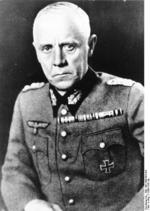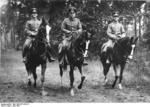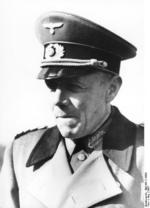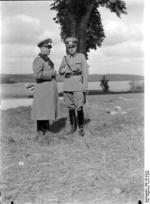Ludwig Beck
| Surname | Beck |
| Given Name | Ludwig |
| Born | 29 Jun 1880 |
| Died | 20 Jul 1944 |
| Country | Germany |
| Category | Military-Ground |
| Gender | Male |
Contributor: C. Peter Chen
ww2dbaseLudwig August Theodor Beck was born in Biebrich, Hessen-Nassau, Germany. During WW1, he served on the Western Front as a staff officer. During the inter-war years, he served in various staff and command positions. In 1930, he was a leading witness for the defense at the trial in Leipzig, Germany of three officers who, against regulations, were members of the Nazi Party and were caught distributing Nazi Party literature; during the trial, Beck met Adolf Hitler, and was impressed by his character. Between 1931 and 1932, he oversaw the publication of a German Army operations manual titled Truppenführung; a revised edition of the manual is still in use today by the Federal German Army. In 1932, he was promoted to the rank of lieutenant general. In 1933, as the Nazi Party seized power in Germany, Beck wrote "I have wished for years for the political revolution, and now my wishes have come true. It is the first ray of hope since 1918." Between 1933 and 1935, he served as the Chief of the Troop Office, and between 1935 and 1938 the Chief of the General Staff.
ww2dbaseDuring this time, Beck lived in a modest home in the Lichterfelde suburb of Berlin, Germany. He typically worked from 0900 to 1900 hours daily, and was known for his intelligence and work ethics. The expansion of his political influence in the German Army, however, created some resentment among his peers.
ww2dbaseWitnessing Hitler's aggressive political maneuvers, Beck warned of the dangers of entering a war prematurely, but he was a supporter of Germany waging an eventual war that would re-establish Germany's reputation as an European power. In 1935, he had a series of meetings with Prince Bernard von Bülow, the State Secretary of the German Foreign Office and the Chief of the Hungarian General Staff to discuss plans to invade Czechoslovakia. In May 1937, he refused an order to create a plan for the invasion of Austria for that he believed such a move would start a war that Germany was not ready for; he threatened with resignation should German leadership not take heed of his warnings, and said that many army officers would resign along with him as well. On 12 Nov 1937, though still not believing that Germany was strong enough to start a war that the United Kingdom and France would definitely oppose, he submitted a memorandum suggesting that Germany should start planning for such acts of aggression.
ww2dbaseIn the late 1930s, Beck began to lose faith in Hitler as the German leader visibly favored the Nazi SS organization over the army. By 1938, he had established himself as the senior general who dared to challenge Hitler's plans for war. When he learned of the plan to invade Czechoslovakia, he argued in a memo to Hitler dated 5 May 1938 that German was no match for the combined force of the United Kingdom and France, with the latter fielding the strongest army in Europe. On 22 May, Hitler responded by calling Beck's thinking that of the older generation of German Army generals; Hitler noted that Beck was "one of the officers still imprisoned in the idea of the hundred-thousand-man army". On 29 May, after a meeting with top German officials including Hitler, he prepared another memo arguing that the army of Czechoslovakia was not as weak as Hitler imagined, thus a war in 1938 would be premature. Initially he blamed Hitler's wish for war on his military advisors, who he deemed incapable of their roles, but by this time he had realized it was Hitler who had the ambitions, and attempted to coordinate a mass resignation of top army officers in attempt to persuade Hitler to abandon the notion for a war in 1938, but other officers, including Walther von Brauchitsch and Erich von Manstein, did not join his efforts.
ww2dbaseOn 29 Jul 1938, Beck wrote a memo stating that the German Army had the duty to prepare for wars against foreign enemies as well as "for an internal conflict which need only take place in Berlin". In Aug, he wrote to Brauchitsch noting that a "house cleaning" of the Nazi German government was necessary, in which the influence of the SS must be reduced, but Hitler should remain as the ruler for the stability of the country. On 10 Aug, at a meeting between Hitler and top army generals, Beck found himself having to defend from many attacks from Hitler. On 18 Aug, Beck resigned, and on 27 Aug, he vacated his office. Hitler offered a major field command if Beck kept his resignation a secret, which Beck accepted, but instead, Hitler placed Beck on the retired list.
ww2dbaseNow known as someone who opposed Hitler, Beck was contacted by a small number of senior officers who intended to overthrow Hitler. This group contacted the British Foreign Office and advised the United Kingdom to issue a stern warning against Germany should Germany move against Czechoslovakia. Instead of issuing such a warning, British Prime Minister Neville Chamberlain and French Prime Minister Édouard Daladier instead negotiated for Germany's annexation of Czechoslovakia. After the European War started in Sep 1939, Beck was in contact with a number of high ranking German leaders about a possibility of removing the Nazi Party from influence while still maintaining Hitler as the leader. The group planned to overthrow the Nazi government and negotiate a peace with United Kingdom and France which would allow Germany to keep most of the German conquests up until that time, including western Poland. The group also planned to have Beck head of the Council of Regency that would govern Germany while the House of Hohenzollern was prepared to restore the German monarchy. In 1943, Beck planned two abortive attempts to assassinate Hitler by bombs.
ww2dbaseIn 1944, Beck was one of the main leaders of the July 20 Plot; in this plot, he was again chosen as the head of a new German government should the plan succeed. When it failed, he was arrested by General Friedrich Fromm, who offered Beck a chance to commit suicide. He attempted suicide, but in failure he only severely wounded himself, and an army sergeant was brought in to put a bullet in his head. He was the only July Plot conspirator to not have been executed by firing squad.
ww2dbaseSource: Wikipedia.
Last Major Revision: Jun 2009
Photographs
 |  |  |  |
Ludwig Beck Timeline
| 29 Jun 1880 | Ludwig Beck was born. |
| 3 Jun 1938 | Ludwig Beck sent a message to German Army chief Walther von Brauchitsch, noting his concern that an invasion of Czechoslovakia would trigger military reaction by the western powers, which would spell doom for Germany. |
| 16 Jul 1938 | Ludwig Beck sent another message to German Army chief Walther von Brauchitsch, noting his concern that an invasion of Czechoslovakia would trigger military reaction by the western powers, which would spell doom for Germany. He also included in this message that Brauchitsch should incite German Army generals to resign en masse in protest of Adolf Hitler's reckless invasion plan. |
| 19 Jul 1938 | Ludwig Beck met with German Army chief Walther von Brauchitsch, attempting to persuade him to use his influence to put a stop to the invasion of Czechoslovakia. He also offered suggestions on what he thought Adolf Hitler's government should be doing, mainly social and civil concerns, instead of provoking war at this stage of Germany's rearmament. |
| 18 Aug 1938 | In Berlin, Germany, Colonel-General Ludwig Beck was forced to resign as Chief of the Army General Staff because of his consistent opposition to Adolf Hitler's decision to attack Czechosovakia. |
| 22 Jan 1943 | Ludwig Beck and other anti-Hitler conspirators met at the home of Peter Yorck von Wartenburg. |
| 20 Jul 1944 | Ludwig Beck passed away. |
Please consider supporting us on Patreon. Even $1 per month will go a long way! Thank you. Please help us spread the word: Stay updated with WW2DB: |
Visitor Submitted Comments
23 Sep 2010 04:55:43 AM
Thank you for this info I learned a lot about my great great uncle maybe in highschool I can use this site for research. Again thank you so much for allowing me and everyone else to read this :) Caitlyn,13
6 Jul 2016 09:25:45 AM
Can't find any info on his family members - brothers, uncles etc.
20 Jul 2024 01:04:15 PM
Rommel was given the option to commit suicide, which he exercised by taking cyanide.
All visitor submitted comments are opinions of those making the submissions and do not reflect views of WW2DB.

» July Plot
- » 1,176 biographies
- » 337 events
- » 44,933 timeline entries
- » 1,245 ships
- » 350 aircraft models
- » 207 vehicle models
- » 376 weapon models
- » 123 historical documents
- » 261 facilities
- » 470 book reviews
- » 28,471 photos
- » 365 maps
George Patton, 31 May 1944
Please consider supporting us on Patreon. Even $1 a month will go a long way. Thank you!
Or, please support us by purchasing some WW2DB merchandise at TeeSpring, Thank you!
22 Aug 2009 06:51:07 PM
Actually Mr.Chen quite a few of the conspirators were hung. The hangings took place at place called Plotzensee Prison.